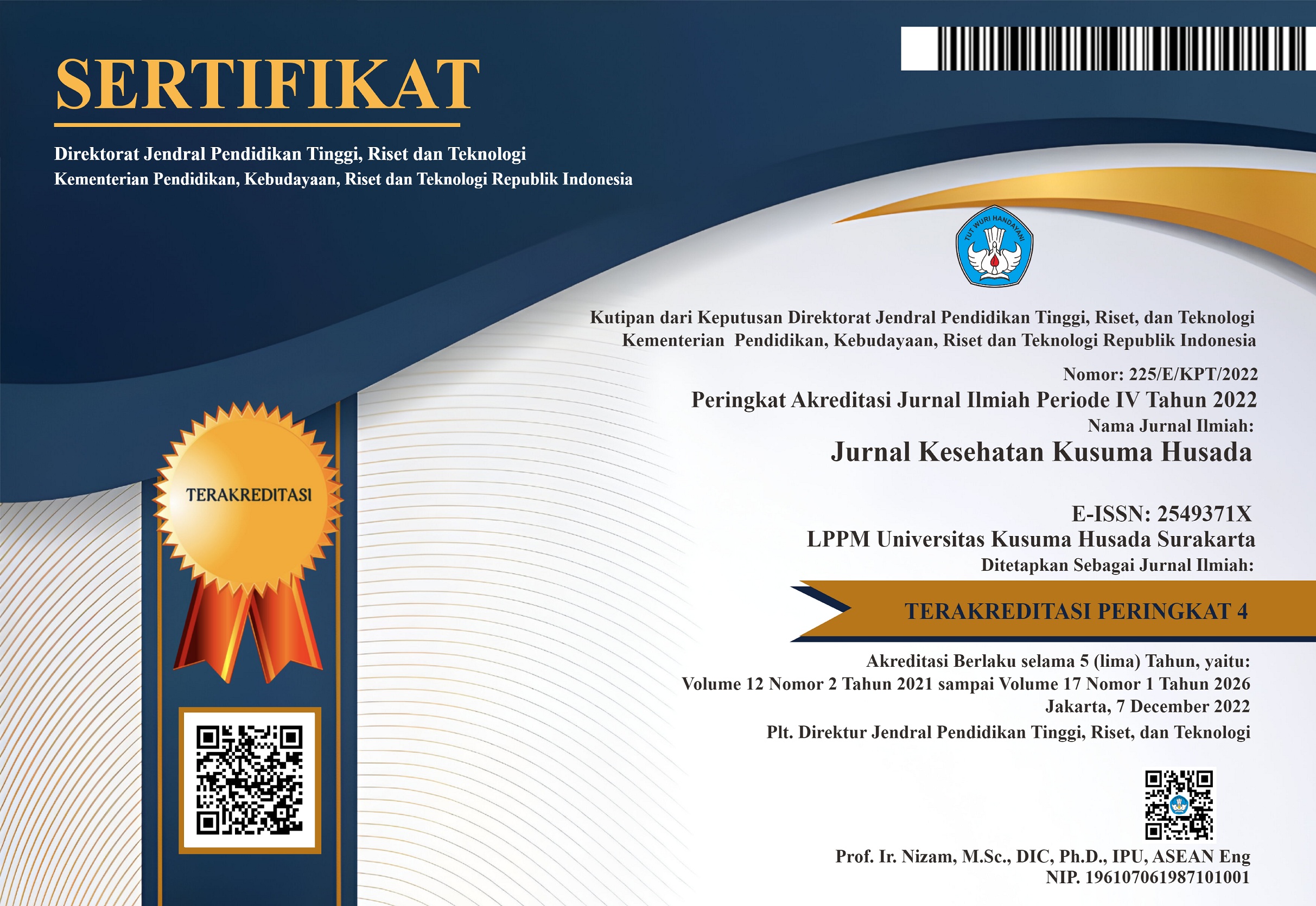UJI AKTIVITAS ANTIBAKTERI EKSTRAK ETANOL LIMBAH KULIT PISANG KEPOK (Musa paradisiaca L.) TERHADAP Shigella dysenteriae
DOI:
https://doi.org/10.34035/jk.v12i2.713Keywords:
antibakteri, ekstrak etanol, shigella dysenteriae, antibacterial, etanol extract, musa paradisiaca LAbstract
Kasus diare di Indonesia pada umumnya disebabkan oleh masalah kebersihan lingkungan, makanan, dan infeksi mikroorganisme. Salah satu mikroorganisme penyebab diare adalah bakteri Shigella dysenteriae. Kulit pisang diketahui mempunyai sifat anti bakteri. Tujuan penelitian ini untuk mengetahui kemampuan ekstrak etanol 96% limbah kulit pisang kepok (Musa paradisiaca L.) membentuk zona radikal terhadap Shigella dysentriae berdasarkan variasi konsentrasi. Penelitian ini menggunakan desain penelitian analitik eksperimental dengan pendekatan post test with control. Ekstrak etanol 96% kulit Musa paradisiaca L. dibuat dengan variasi konsentrasi 20%, 40%, 60%, 80%, dan 100%. Aktivitas antibakteri diuji dengan metode cakram dengan kontrol negatif DMSO 10% dan kontrol positif ciprofloxacin 5 µg, dan dilanjutkan dengan analisis Anova satu jalur. Hasil dari penelitian ini menunjukkan terbentuknya zona hambat pada konsentrasi 20%, 40%, 60%, 80%, dan 100% berturut-turut 6,09 mm, 6,26 mm, 6,58 mm, 7,58 mm, dan 9,00 mm. Hal ini menunjukkan semakin tinggi konsentrasi zat antibakteri maka semakin besar juga zona hambat radikal yang terbentuk. Uji Anova satu jalur diperoleh nilai p ≤ 0,05, sehingga dapat disimpulkan bahwa ekstrak etanol 96% kulit Musa paradisiaca L. mampu menghambat pertumbuhan Shigella dysenteriae.
Diarrhea cases in Indonesia are generally due to environmental problems, food hygiene, and microorganism infections. One of the microorganisms that cause diarrhea is Shigella dysenteriae. Banana peels are known have antibacterial properties. The purpose of this project was to study the antibacterial activity of 96% ethanol extract of Kepok banana (Musa paradisiaca L.) peel waste with variations concentration on the growth of Shigella dysenteriae. This study uses an experimental analytic research design by post test with control. Ethanol extract 96% of the peels of Musa paradisiaca L. was made with a composition variation of 20%, 40%, 60%, 80%, and 100%. Antibacterial activity was tested by disc-method with DMSO as negative control and ciprofloxacin as positive control. The data obtained were analyzed with one way Anova. The results of this study indicate the formation of inhibition zones at concentrations of 20%, 40%, 60%, 80%, and 100% collected 6.09 mm, 6.26 mm, 6.58 mm, 7.58 mm, and 9,00 mm. This data shows that the greater the concentration of antibacterial substances, the greater the zone of radical inhibition formed. Anova one path test obtained p value 0.001, so it can conclude that ethanol extract 96% of the skin of Musa paradisiaca L. able to inhibit the growth of Shigella dysenteriae.
References
Downloads
Published
Issue
Section
License
Copyright (c) 2021 Jurnal Kesehatan Kusuma Husada

This work is licensed under a Creative Commons Attribution 4.0 International License.
The copyright of the published articles belongs to Jurnal Kesehatan Kusuma Husada.

This work is licensed under a Creative Commons Attribution 4.0 International License.
















